Was journalist who had tea with ISIS sacked from The Guardian for sexual assault and violence?
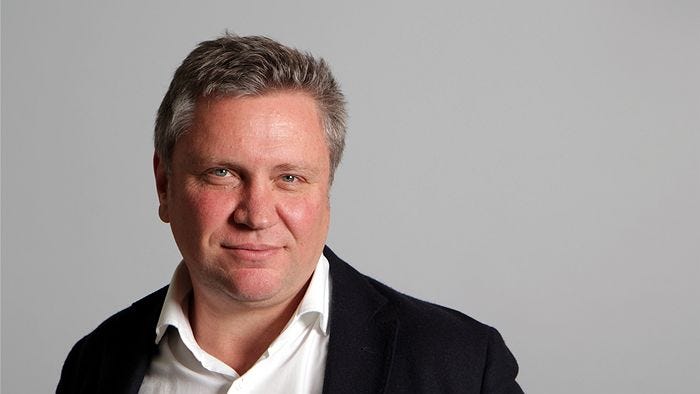
The curious tale of Martin Chulov, journalist or MI6 spook?
According to a Daily Mail report, former Guardian journalist Martin Chulov is under investigation for allegedly sexually assaulting and hitting a woman. The Daily Mail report does now appear to have mysteriously disappeared.
State propaganda asset dismissed from the Guardian.
Will his coverage of the faked Syrian ‘chemical attacks’ in which he performed valuable service for MI6 now be re-examined?
Martin Chulov sacked as The Guardian's Middle East Correspondent https://t.co/UOHIA2vt82
— David Miller (@Tracking_Power) September 2, 2024
Chulov also faces separate allegations of violence towards another woman and subjecting her to coercive control. After investigation Chulov was apparently cleared as no further action was taken against him.
Chulov has not reported for The Guardian since April. According to the Mail, he was sacked after internal complaints against him were “upheld”. Chulov is denying all charges which include racist slurs against Arabs and Turks. You can read more here.
I did mention that the article at the Daily Mail does appear to have dematerialised. An investigation (February 2018) that I did into Chulov’s work supporting regime change in Syria and the associated terrorist groups that he (and many other establishment media outlets) described as “rebels” – may just provide the answers as to why Chulov appears to be well protected:
SYRIA: The Guardian Journalist who takes ‘Afternoon Tea’ with ISIS and Survives.
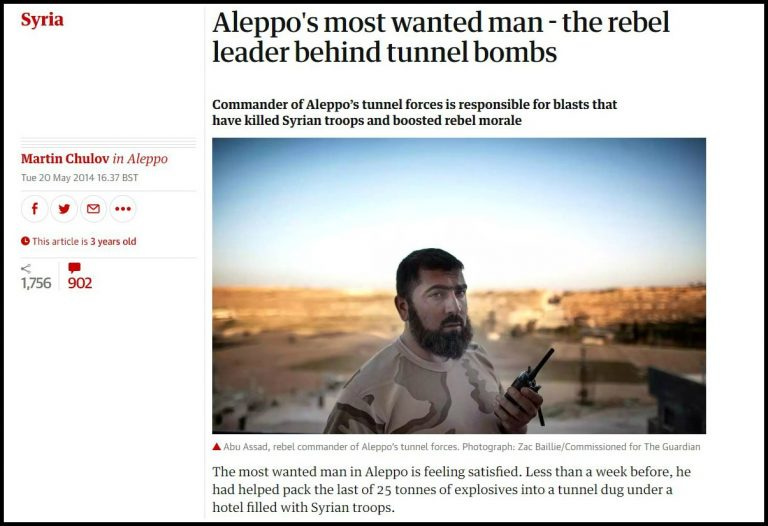
A May 2014 Guardian headline from Martin Chulov whitewashing terrorist faction crimes in East Aleppo.
The war in Syria has resulted in the deaths of hundreds of thousands, the majority are most likely to be from among the Syrian Arab Army soldiers, defending their country and their people against the wave of terrorism that has been unleashed upon Syria by a cabal of over seventy UN member states. Another regime change war under the familiar banner of “humanitarian” intervention on behalf of the “people” who are, again, dying in droves thanks entirely to this latest US/UK/EU-Coalition proxy military intervention.
Who created that war, fuelled it, armed it and maintained it? The US/UK/EU Coalition supported by its client states in Saudi Arabia and Israel. Who ensured that the public in the West only received notification of a remote “humanitarian” crisis that we must prevent, at all costs? Who produced the villains, manufactured the heroes? The corporate and state media in the West, that’s who.
As a senior British intelligence official noted of the 2001 US-led invasion of Afghanistan – ‘It is always helpful for governments who want to get the Guardian readers of the world on board, to have a humanitarian logic.’ ~ MediaLens
In this series of articles I would like to raise specific questions with reference to The Guardian and its journalists who have played a crucial role in the maintenance of a narrative that whitewashes the crimes that ‘Global Britain‘ is committing against the sovereign nation of Syria and its people. I will look at the roles of individual journalists and The Guardian as a whole in gatekeeping truth and protecting power during the almost seven year conflict that has raged inside Syria.
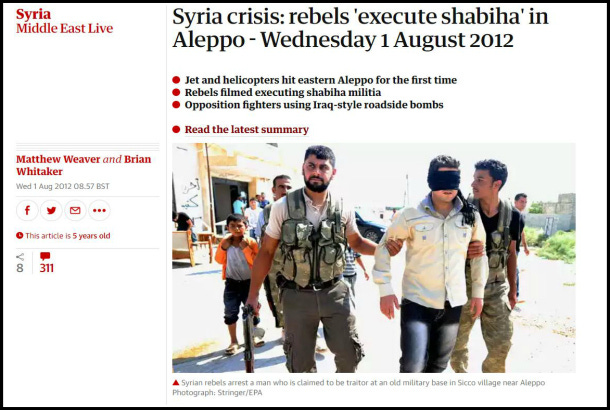
The Guardian August 2012.
Back in 2012, The Guardian began its campaign to justify “humanitarian” intervention in Syria, by global players such as the UK, US and EU. One of its earliest “summaries of the latest developments” headlined with the execution of “Shabiha” by “rebels in Aleppo”. So, The Guardian left us in no doubt as to the direction its bias was going to take. Shabiha is the derogatory term employed by all terrorist & “moderate” extremist factions inside Syria, to describe anyone who does not adhere to their sectarian ideology and who, by default, must be a “Syrian regime supporter” – eligible for extra-judicial execution. The executioners, violating all rules of law concerning war, are glorified as “rebels”. The Guardian has rarely, if ever, deviated from this portrayal of the Syrian conflict and has fed images of “good rebel” versus “bad Shabiha” to its liberal/left ‘moderate’ readership for the last seven years, with very few exceptions.
This headline was produced after a phone call between The Guardian and the Liwa Al Tawhid Brigade (ATB) financed by Qatar, France and Turkey. ATB were formed in preparation for the invasion of Aleppo in 2012, with one objective, to take Syria’s industrial capital by force. Like so many of the so-called “moderate” groups, they have escaped classification as an ‘official’ terrorist faction:
“Since December 2015, the UN Security Council has been trying to assemble a list of terrorist groups in Syria. Russia, Lebanon, Egypt, Iraq, and the United Arab Emirates support classifying Liwa al-Tawhid as a terrorist group, but they have not been able to achieve a unanimous consensus.” ~ Stanford.edu
The Guardian does not allude to ATB’s terrorist leanings, instead they convey the concept of a ‘unifying force’ to their readership:
“In a telephone interview with the Guardian, a spokesman for the Tawheed (“Unification”) Brigade in Aleppo has described “field trials” of shabiha suspects. He said those believed to have been involved in killing were executed, while others are being kept for trial “after the collapse of the regime”.”
I do not advise watching some of the videos that circulated around the same time as The Guardian presented this misleading headline. They depict the massacres of SAA soldiers & police officers, some beheaded, many bodies mutilated beyond recognition, hands tied behind their backs, twisted, broken corpses piled up against a wall. It is inhumanity on a grotesque scale but according to The Guardian’s misrepresentation, entirely justifiable, because, after all, they are suspected “Shabiha”.
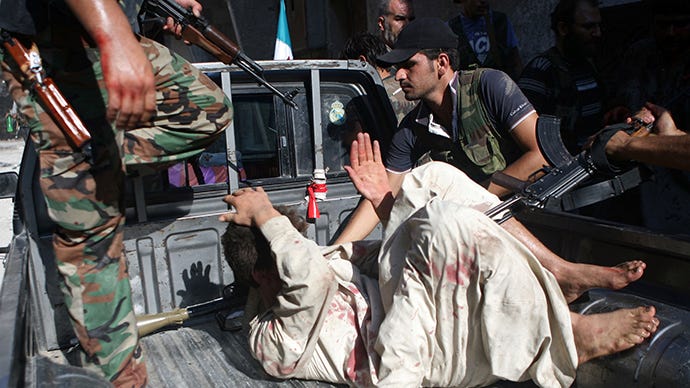
The capture of a “suspected” Shabiha. July 31st 2012. Aleppo.
“The footage shows several bloodied men stripped down to their underwear being forced to kneel by a wall amidst a throng of excited, machine gun-touting men. Once their captors open fire, the camera jerks away as the crowd momentarily disperses, seemingly unprepared for the nearly 40 seconds of uninterrupted shooting that follows. As the gunfire dies down, shouts of “Allahu Akbar!” resound as the once skittish onlookers victoriously raise their guns in the air, approaching what appears to be a pile of stripped-down corpses. Clive Baldwin, a senior legal adviser for Human Rights Watch (HRW), told BBC News: “What it looks like is execution of detainees and if that is the case, that would be a war crime.” ~ War Crime?
So, The Guardian dehumanisation of the Syrian Arab Army began, and has continued until today. “The Syrian Arab Army belongs to the people and the Syrian people belong to the Army” – is the description most frequently given to me by the families of SAA martyrs, inside Syria, but The Guardian has steadfastly denied this fact. It does not compute with their “humanitarian” war narrative that must have a tangible villain for it to be effective.
From the beginning of the conflict, The Guardian and its journalists have effectively colluded with terrorist factions inside Syria. They have presented their version of the facts as truth almost without question and have failed in their journalistic duty to fully explore diverging views that might drammatically alter public perception of the Syrian conflict, in the West. The Guardian has sensationalised the Syrian conflict, paid no heed to its multi-layered complexities and has regularly presented the terrorist factions as conservative “freedom fighters”.
Martin Chulov
According to Martin Chulov’s Guardian biography, he “covers the Middle East for the Guardian, won the Orwell prize for journalism in 2015″.
In a 2016 article, entitled “Ground down by savagery – the agony of Aleppo” Chulov informs his readers that:
“In more than 10 journeys to Aleppo, from that first visit in 2012 until my last in December 2014, I have chronicled the decline of one of the world’s oldest continually inhabited cities as it has been ground down by savagery. Modern warfare has done what uprising and invasion have failed to do throughout the ages, transforming half the city into a shell of its prewar self, and imperilling an ancient core that has weathered centuries of conflict and even a devastating earthquake.” (emphasis added)
Chulov also mentions:
“The rebel-held east was the focus of all my visits; west Aleppo has remained off-limits, functioning with little disruption and firmly under the control of the Syrian regime, which refuses visa requests.” (emphasis added)
From these two statements it can be ascertained that it is extremely unlikely that Chulov has ever entered Syria legally. He has most probably entered East Aleppo via Turkey, with some degree of terrorist facilitation along the route and during his time in East Aleppo. It is worth asking The Guardian if Chulov has ever applied for a visa with the correct authorities in Damascus, a process that all foreign journalists must follow in order to enter Syria and one that most legitimate journalists respect.
I took the liberty of making such enquiries with the Media Ministry in Damascus who informed me that they have no record of any such application from Chulov during the timespan he describes in his article – from 2012-2014, nor in the years following his initial exploration of the Nusra Front/Al Qaeda dominated eastern suburbs of Aleppo.
Chulov’s claim that the Syrian government ‘refuse visa requests‘ appears dishonest on the basis that there is no record of Chulov ever having applied for one. The fact that Chulov has entered Syria illegally and has spent time with terrorist factions in East Aleppo would be basis enough for any self-respecting government to refuse him access to the areas most under threat from those same terrorist factions.
Any sane human being would have no problem grasping that logical reaction, but the fact remains, Chulov has never attempted to report on the Syrian conflict from the perspective of those who support the Syrian state, the Syrian Arab Army and its allies in their battle against international terrorism. In other words, Chulov has failed to address the concerns of 80% of the Syrian population in West Aleppo in favour of a terrorist controlled narrative of 20% of civilians in East Aleppo. Civilians who were largely being held hostage, starved, imprisoned, executed, or used as human shields by the terrorist factions that Chulov associated with.
For further insight into the disingenuity of many western journalists’ claims of “no visa”, I highly recommend reading Sharmine Narwani‘s article in Al Akhbar – Western Journalist, Visa Denied.
In his “Ground down by savagery” article, Chulov describes Aleppo as:
“Aleppo had been a focal point of the initial civic protests, and was now an epicentre of a rebel push, the scars of which were everywhere.”
Tony Sayegh is a surgeon registered with the Aleppo Medical Association in West Aleppo. A surgeon who stayed in West Aleppo to help civilians during the five year occupation of East Aleppo by Nusra Front and allied extremist factions. Sayegh categorically disagrees with Chulov’s version of events.
“The people of Aleppo lived a normal life like in any city. It was a quiet town. Aleppo is Syria’s economic and industrial capital. During the first year of the Syrian crisis many people moved here from other cities, because in Aleppo it was quiet and the economical situation was good.
In July 2012 everything changed. But it was not the residents of Aleppo who rebelled against the rulers. Parts of the city were invaded by armed groups with fighters from other areas of Syria and from other countries. Tony Sayegh believes that the interests at stake of the invasion was much bigger than the control of a single city.
The attempt to overthrow the government of Syria with weapons and riots had failed. Then they decided to focus on Aleppo, to turn against the whole Syrian economy. The armed groups took over the water utilitys and power plants to stop the supplys to the residents, and they focused on the industries. Entire factorys were taken down and driven to Turkey. They stole everything. That was when everything turned upside down and the bad days of Aleppo began.” ~ Aleppo been under fire from Terrorists for four years.
Sayegh’s testimony is echoed not only by other doctors and medical staff in West Aleppo, like Dr Nabil Antaki (gastroenterologist), Dr Zahar Buttal (Director of Aleppo Medical Association), Dr Bassem Hayak (Director of Ibn Khaldoun Psychiatric Hospital) but it was also confirmed, almost universally, by civilians in both West and East Aleppo prior to and after liberation of East Aleppo by the SAA and allies in December 2016.
Chulov chose to embed himself with the extremist and terrorist factions that ruled East Aleppo with violence, brutality and sectarian elitism for almost five years. This choice resulted in The Guardian effectively lionising terrorism to its readers, while denigrating the Syrian Arab Army who were both victims of the terrorist brutality and ultimate victors against their forces during the final liberation of East Aleppo in December 2016.
Chulov mentions the occupation of the hospitals in East Aleppo by “rebel” factions “We drove past a hospital complex that rebel groups were busy commandeering as a headquarters”, yet he later condemns the targeting of those hospitals by Russian planes during final months of the Syrian military campaign to drive out the many brigades of cross border militants and terrorists:
“…taking to more than 40 the number of hospitals and medical clinics that had been destroyed and damaged in east Aleppo since the Russian intervention to support the Syrian leader one year ago.”
Chulov also hugely exaggerated the targeting of hospitals in East Aleppo as did the majority of mainstream media and UN affiliated NGOs. After Aleppo’s liberation, I personally visited and walked around many of the original hospitals in East Aleppo, that had been occupied in the main by Nusra Front and were most definitely not treating Syrian civilians except on rare occasions.
I can hear the chorus of “not everyone is a terrorist” from the defenders of the “humanitarian war” narrative, even as I write this article. So I will present a little more evidence of Chulov’s affinity with the terrorist community during his ten clandestine trips to East Aleppo:
I start with the image in Chulov’s 2016 “savagery” article with the caption “A wounded rebel fighter is carried to safety, October 2012.” What an emotive image and with the “rebel” moniker attached, I am sure it pulled on a few heart strings back at base in the UK. These militants have been identified as Nusra Front, Al Qaeda in Syria – from the headbands. Do we suppose that in 2012, Chulov was ignorant of the symbols, flags and logos that differentiated the various terrorist factions from their marginally less extremist counterparts?
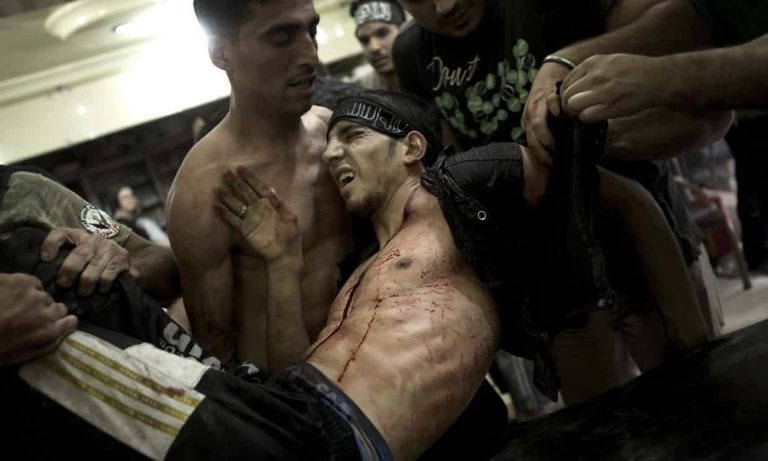
Image from The Guardian.
Chulov – Aleppo August 2012
The ‘kittenization‘ of the “rebels”:
“As they do they need to avoid trampling on the only other thing that seems to be living at ground zero of the battle for Syria – kittens. Rebels have taken in many of them, and it’s not uncommon to find a gnarled, sweaty guerrilla sleeping on the floor of a commandeered flat with an abandoned kitten asleep on his chest.”
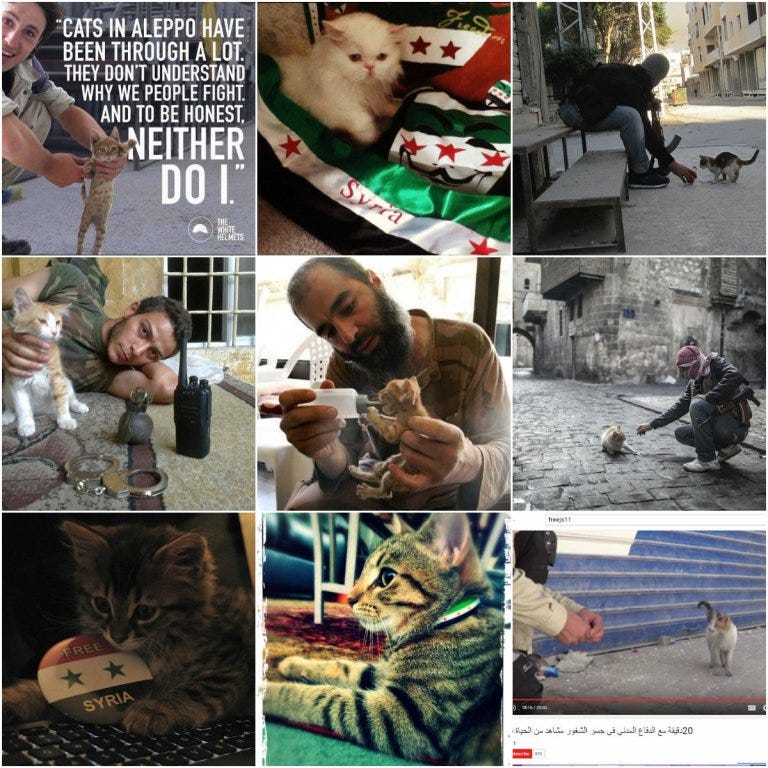
Chulov – Aleppo August 2012
“Were Aleppo to fall it would almost certainly be followed by Damascus, amplifying the 1500 [sic] schism between Shia Islam, whose leaders are backing the regime and the region’s Sunnis, whom mostly oppose it.”
Bring in the false sectarian narrative, one that is palpably misleading. Most moderate Sunnis in Syria support the Syrian state and Army. All Syrians that I have spoken to inside Syria would be horrified to hear such a sectarian statement being made on their behalf. Syrians consider themselves to be Syrian first, their religion is secondary. Aside from that, the Syrian government and the Syrian Arab Army are majority Sunni Muslim in their make up.
Chulov then reiterates the “no visa” canard – “It is difficult to gauge though; any reporter found by an official without a regime-issued visa for entering Syria would quickly experience life on the inside of the feared police state, the pillars of which are in an administrative district only two miles away.” I am pretty sure that if a US or UK security official discovered a foreign agent in their country, having tea with a known terrorist organisation, without an entry Visa, they would also take the individual in for questioning – even in peace time.
Throughout his series of East Aleppo or Idlib reports, Chulov moves unhindered and safely among terrorist factions that include ISIS and Nusra Front:
“(Chulov) writes from a roadhouse near Aleppo where jihadists and al-Qaida affiliates prepare to face the US enemy. […] Abu Abid was speaking inside a roadhouse east of Aleppo, where he and other jihadists whom he says “come from every country you could imagine” gather to eat, and drink tea or coffee.
The black banner of al-Qaida, adopted by ISIS, is more prominent in al-Bab than the gold-edged flag of the other al-Qaida-linked group, Jabhat al-Nusra, or the regular units of the Free Syrian Army. Behind two wrought-iron gates was the ISIS command centre, emptied of most of its men before the anticipated air strikes.” ~ American threats widen fault lines among Syria’s rebels
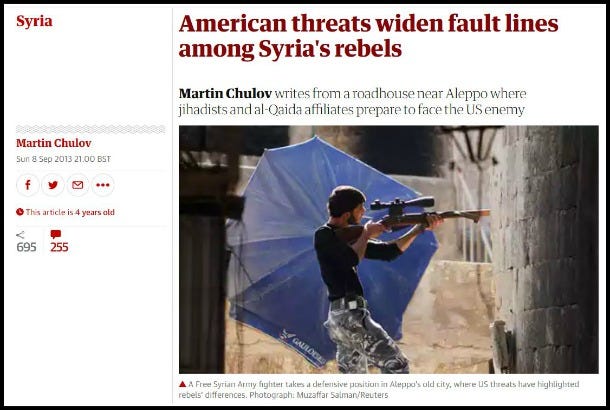
In September 2013 (in the same article) Chulov is interviewing an ISIS leader in Al Bab:
“ISIS’s leader, Abu Ismail sees little threat from an Awakening Movement in Syria. Himself an Iraqi, a veteran of al-Qaida’s operations in his homeland, he said:
“We are good with the people here. If an emir does something wrong he will be punished according to the sharia too. There is not one rule for us and one for the people. A Sahawa is not something that we think about.”
This discussion with the ISIS leader is not a one off. Chulov had also previously communicated with Abu Ismael in November 2012:
“Abu Ismael made no secret of his wish for Syria to be the heartland of an al-Qaida-led renaissance. Nor, unusually, did he hide what he had done in Iraq, or what he planned to do in the new war. In a candid hour-long discussion, he offered a rare insight into the terror group’s designs on Syria and the organisation’s fraught battle to assert itself. “I was a member of the al-Qaida organisation from 2005-11,” he said, his black eyes set in an unflinching stare. “I joined them with my father when I was 16 and apart from one and a half months in prison, I was very active in every way.”
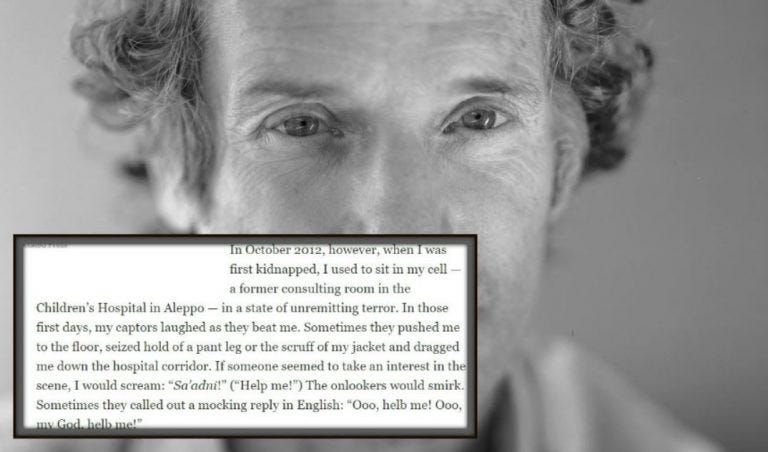
While Chulov was talking with Ismael, American journalist, Theo Padnos (photo above) was being tortured and beaten, imprisoned in the East Aleppo Eye & Childrens Hospital in Qadi Askar, East Aleppo. The Eye Hospital and Childrens Hospital was a huge complex, at that time partially under control of ISIS, later taken over fully by Nusra Front in 2014.
Padnos, according to his testimony had been captured by Nusra Front and brought to the Childrens Hospital in East Aleppo. These hospitals were used as a Sharia Court, prisons, torture chambers and an execution centre for Syrian civilians who did not capitulate to the extremist ideology of their occupiers, the US coalition-funded, armed and supported terrorist factions. The video below was filmed during my visit to these premises in April/May 2017. Watch:
Somehow, while in the company of Ismael for an hour in November 2012 and again, one year later in 2013, Chulov seemingly failed to mention the kidnapping and detention of Padnos. Chulov also didnt bring up the US photojournalist, Matthew Schrier, who joined Padnos in his East Aleppo cell in January 2013.
Then there is Steven Sotloff, kidnapped by ISIS, in Aleppo, in August 2013, allegedly beheaded in September 2014. Remember that Chulov was sat taking tea with ISIS in Al Bab, one month after Sotloff’s kidnapping. Rather than address the terrorist misdemeanours against other media colleagues in The Guardian, Chulov, prefers to convey a quaint sense of camaraderie and conviviality among terrorists.
“Kalashnikovs are laid across tables next to salt and pepper shakers, which the waiters gently rearrange to serve plates of grilled chicken and salads.” ~ Chulov in Al Bab
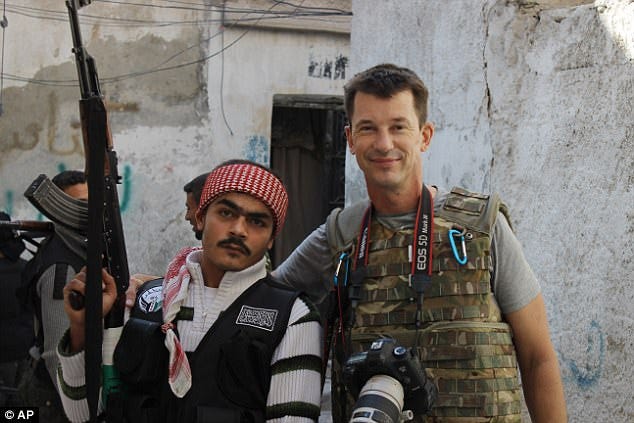
John Cantile with armed “moderate” extremist in Aleppo 2012. Photo: Daily Mail
In November 2012, John Henry Cantile, a British journalist and James Foley, an American “journalist” were kidnapped in Idlib. Foley was later allegedly beheaded by ISIS in 2014. Cantile is still missing and it has never been reliably confirmed if he is dead or alive.
You might think that Chulov would be deterred by all these kidnappings and beheadings of media personnel. At least two experienced journalists have later expressed a reluctance to enter such terrorist strongholds as East Aleppo or Idlib:
PATRICK COCKBURN: “One factor making the sieges of east Aleppo and east Mosul so similar, and different, from past sieges in the Middle East, such as the Israeli [sic] siege of Beirut in 1982 or of Gaza in 2014, is that there are no independent foreign journalists present. They are not there for the very good reason that Isis imprisons and beheads foreigners while Jabhat al-Nusra, until recently the al-Qaeda affiliate in Syria, is only a shade less bloodthirsty and generally holds them for ransom.” ~ Patrick Cockburn for the Independent, December 2016.
PETER OBORNE: “I met one schoolmistress who had just made a terrifying journey from her home in an Islamic State-controlled area just east of Aleppo to collect her monthly salary of 30,000 Syrian pounds (about £50) from the education directorate in the city centre. Before the war, this journey had taken barely 40 minutes. Hers had taken five days as she made her away across Al-Nusra and Islamic State road blocks. The teacher told me that in her home town she was made to dress entirely in black. She said simply: ‘They will kill me if I show any flesh.’ She was forced to live indoors, except when being ordered into the public square to witness the frequent beheadings and crucifixions.” ~ Peter Oborne, in West Aleppo, February 2016.
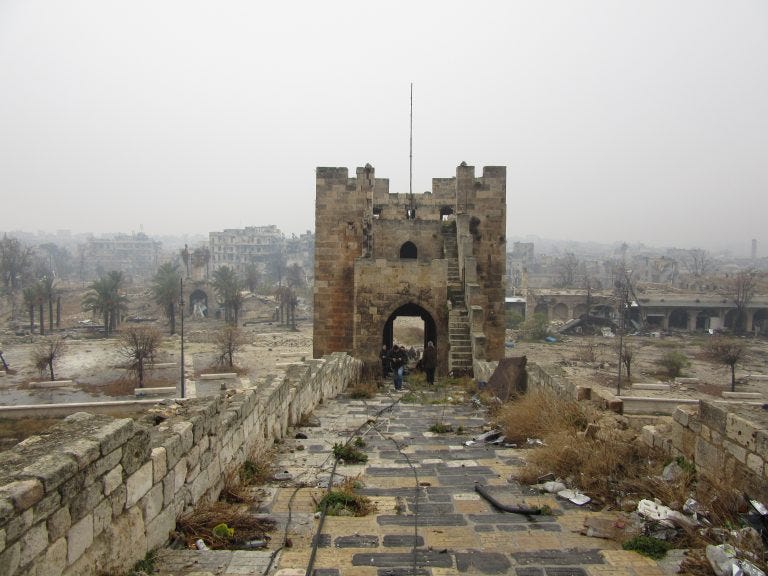
View from inside the Citadel in the Old City, 8 hours after its liberation from Nusra Front. December 2016. (Photo: Vanessa Beeley)
Chulov appears oblivious or impervious to such risks. In May 2014, he was back in East Aleppo, among his “rebel” hosts who had just tunneled under and detonated one of the most iconic buildings in Aleppo City, the Carlton Hotel, which was nestled at the base of the City’s ancient Citadel. Apart from the wanton destruction – the attack, which used 25T of explosives, massacred the Syrian Arab Army soldiers who used the hotel as a barracks on the front lines with the terrorist factions. These soldiers were preventing terrorist advances deeper into the civilian areas of West Aleppo, they were murdered while defending Syrian civilians yet Chulov’s description is far from condemnatory:.
“The giant plumes of dirt and rubble that ballooned several hundred metres skyward as the hotel crumbled, killing 30-50 Syrian troops, have fast become one of the most jaw-dropping images of Syria’s civil war […] Flush with the success of the bomb, Assad chose to reveal himself to the Guardian as the leader of Aleppo’s tunnellers. He claimed not to be bothered by the fact that showing his face would give an already furious military even more reason to hunt him down. “I want them to be scared of me,” he said. “They need to know I am coming for them.” ~ Aleppo’s Most Wanted Man
This is the distressing video of the destruction of the Carlton Hotel:
“Medieval savagery” is one of the terms that Chulov applies liberally to the SAA and its allies but never to the terrorist atrocities, in fact, I have not found one reference in Chulov’s articles from East Aleppo, to the daily mortar & hell cannon attacks, suicide bombings, sniping of Syrian civilians on the “other side” in West Aleppo. During over four years, more than 11,000 civilians were brutally killed, countless more maimed or mutilated as a result of those attacks on densely populated residential areas of West Aleppo. The majority of those innocent victims were children.
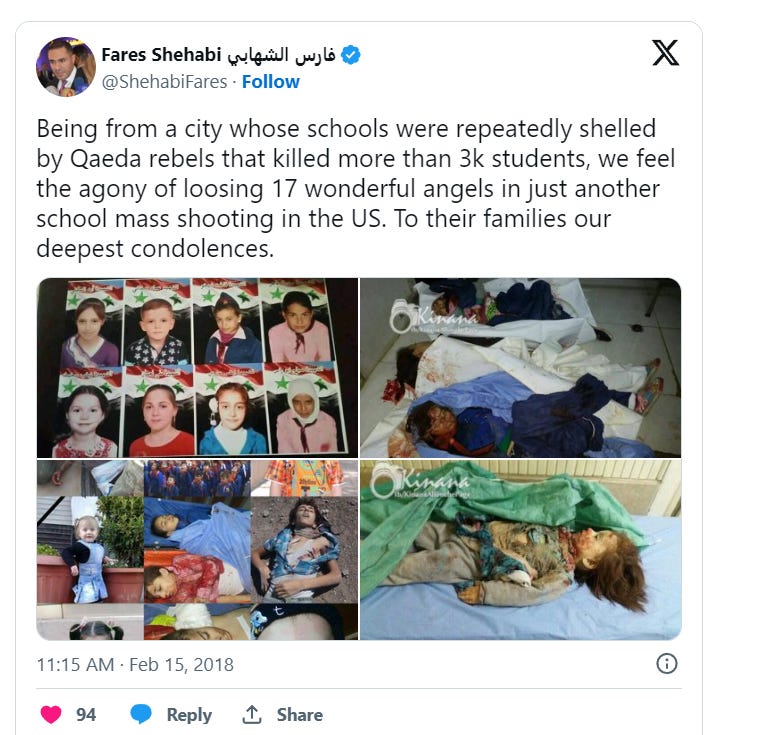
In October 2014, Chulov is back in the terrorist occupied Old City of Aleppo, right on the West-East frontlines between the SAA and Nusra Front/ISIS-led terrorist factions. Chulov is unapologetically mingling with ISIS fighters:
“Nearby, the Islamic Front maintains a field clinic, where its fighters are treated for wounds sustained in clashes with regime troops around the ancient citadel less than a mile away. Islamic Front fighters move slowly through the heart of the Old City’s streets; some shelter in a giant atrium near a soap factory that a dog-eared sign says is heritage listed” ~ Chulov, Aleppo – Hell is Never Far Away.
Conclusions
The ease with which Chulov associates with members of Syria’s terrorist classes is worthy of some serious investigation. The Guardian has apparently endorsed the embedding of journalists inside Syria’s borders without the permission or knowledge of the Syrian government. Were there to be another Baba Amr incident when Marie Colvin was killed in 2012, having illegally ventured deep inside “moderate” extremist territory in Homs, would The Guardian be crying “casus belli” and expressing outrage that the Syrian government has not assured the safety of their “spooks” in Aleppo or Idlib?
Chulov has very possibly entered Syria under the protection of cross border militants or terrorists, he has entered exclusively into terrorist controlled areas of Syria. As a recent BBC Panorama report – Jihadis You Pay For – pointed out:
“The money of British tax payers is being spent very poorly, it is unfortunately strengthening the extremists and Islamic groups, currently in control of the majority of “opposition” areas”
Extremist and Islamic groups are in control of the majority of opposition areas and Chulov is unaffected, on the contrary his rhetoric suggests he is comfortable with this close association. Certainly, he has emerged unscathed by any of the attacks or kidnappings that have affected so many other ‘undercover’ media agents or ‘humanitarian’ actors operating inside the terrorist controlled zones.
Chulov could argue that he is covertly gathering information on the terrorist groups but his articles do not substantiate that claim, if it exists. He effectively amplifies their justifications for the crimes those terrorist factions commit against the Syrian people and Army. These are not indigenous or misguided Syrian “rebels”, they are recognised terrorist or terrorist sub-groups who have a documented record of committing atrocities, not only in Syria.
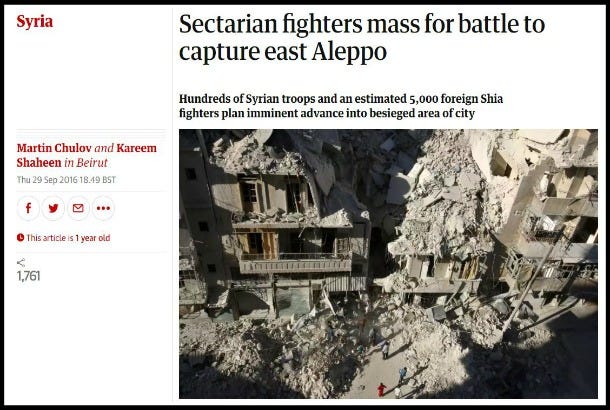
Chulov depicts the Syrian conflict as a deeply sectarian one, he magnifies that narrative at every opportunity:
“All around the edges of Aleppo, yellow and green Shia flags flutter in the wind.”
This description is taken from a September 2016 article co-written by Chulov and another of The Guardian’s ‘undercover-in-Syria’ journalists, Kareem Shaheen. My experience is completely the opposite. I entered West Aleppo in August 2016 and Nov/December 2016, when I also entered East Aleppo once the various districts were empty of terrorists. I passed one checkpoint where Iranian flags were flying and that was on the Khanasser road, nowhere near the centre of Aleppo. This was a deliberate heightening of sectarian tensions by Chulov and Shaheen at a pivotal point in the Syrian military campaign and no prizes for guessing who might have fed them that line.
The portrayal of war as such a simplistic and mercilessly black and white affair is deceptive at best, deliberate misrepresentation at worst. Chulov’s and the colonial media role is to ensure the closure of all doors that may just lead to a peaceful, diplomatic resolution of this conflict by whitewashing the US Coalition-backed foreign mercenaries who have invaded Syria and demonizing the forces who are preventing Syria being overrun by Islamist zealots who would show no mercy to anyone suspected of “Shabiha-ism”.
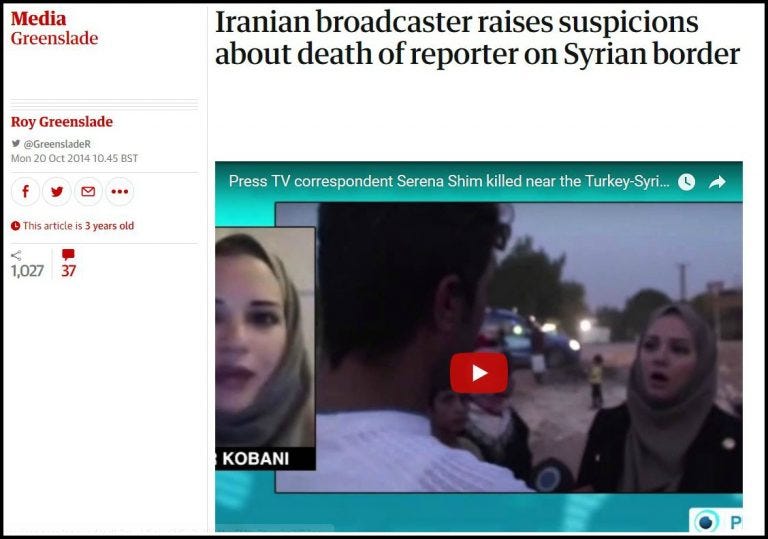
Serena Shim was killed in Turkey, in October 2014, after she had the exceptional courage to report on the transferral of not only, terrorist fighters – also, equipment, weapons and chemical weapon ingredients via the Turkish borders into the hands of the extremist militant groups in Syria. Chulov has survived seven years working among the same terrorist groups. Terrorist groups also accused of carrying out attacks in Europe. To what extent was Chulov’s reporting compromised? What did he do in order to manage his immersion into this terrorist culture, when so many others perished, even those who were also portraying the “rebels” in a sympathetic light?
Did the Guardian or Chulov investigate Shim’s death? A google search reveals nothing more than a typically Iran-phobic, dismissive headline (above photo) putting the responsibility for any investigation into Iran’s court, despite the fact that Shim was a US citizen.
A year after Shim’s death, Chulov finally reported the connection between Turkey and ISIS but has never mentioned the evident collaboration between the UK Government and terrorist affiliated groups inside Syria, such as the White Helmets, better known (by Syrian civilians) as Nusra Front’s Civil Defence.
The Guardian is following a well know recipe for “Humanitarian” war, and Chulov appears to have been dispatched to bring home the ingredients from among the paid mercenaries and terrorist groups that are known to be armed and bankrolled by the US/UK coalition and architects of chaos. Recent revelations that the UK FCO may well be financing the terrorist groups via a number of outreach agents created outside & inside Syria, brings The Guardian’s role into even sharper focus. Chulov is just one of a team of Guardian ‘infiltrators’, who appear to be working closely with those mercenaries and terrorists and whose own motives must surely be questioned.
https://beeley.substack.com/p/was-journalist-who-had-tea-with-isis
 TheAltWorld
TheAltWorld 
0 thoughts on “Was journalist who had tea with ISIS sacked from The Guardian for sexual assault and violence?”